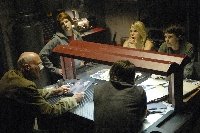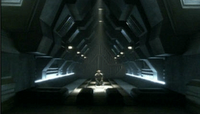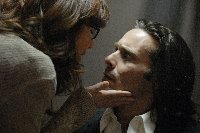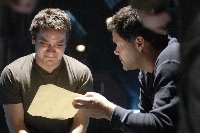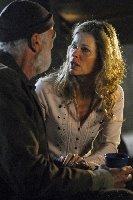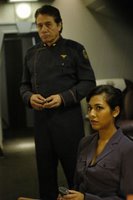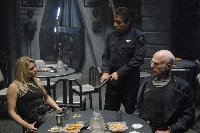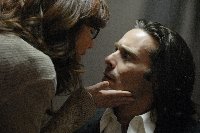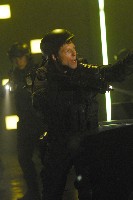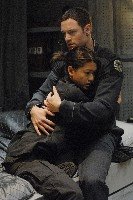 Source: Caprica City
Source: Caprica CityAmong the dozens of guest stars on the new "Battlestar Galactica", Canadian actress Stefanie von Pfetten is probably the only one of German heritage. Although she appeared in only one episode - as Pegasus Viper pilot Captain Marcia „Showboat“ Case – her character has been subject to a remarkable amount of enthusiasm in the web fandom.
During the last years, von Pfetten appeared in numerous made-for-TV movies and episodes of several TV shows, many of which belongend to the sci fi/fantasy genre. In her interview with Caprica City, the actress talks about the early days of her career, her experiences on the set of "Battlestar Galactica", and about Germany.
Caprica City: Hello Stefanie. We're happy to talk to you. Let's start with some basic information. Sadly, there is not much information about you on the Internet. Please tell us something about yourself. Where were you born and raised?
Stefanie von Pfetten: I was born in Vancouver, Canada and both my parents are from Munich. When I graduated from highschool I moved to Vienna and then Munich where I studied art history and did an internship at Sotheby's. It was after that that I moved back to Vancouver and persued acting.
CC: Can you remember your first acting role?
SvP: I do remember my first acting role and being very nervous. My hands wouldn't stop shaking in the casting and the papers I was holding were making so much noise. It was awful but I got the role.
CC: Do you watch the shows and movies you're in?
SvP: I do watch the movies or TV shows that I am in sometimes. I get curious to see what the end result of my work is. That being said it is hard to remain objective...
CC: I watched your movie "Decoys" (2004). Was that your first role in a science fiction production?
SvP: "Decoys" was not my first contact with Sci-Fi genre, I had done many roles on various TV series in that genre.
CC: Did you know "Battlestar Galactica" before you got the role as "Showboat"?
SvP: I was very familiar with "Battlestar Galactica" when I got the role. I have been a fan of both the original and the current series.
CC: Please tell us something about your work on "Battlestar". Did you meet some of the actors?
SvP: Many of the actors on the show are friends of mine and I think they are great on the show. My experience on the set was great! Everyone was very professional and friendly. Jamie Bamber and Katee Sackhoff (my scenes are with them) are very focused actors.
CC: Is there any chance to see "Showboat" again? Maybe as a recurring character?
SvP: I would love to play a recurring role on „Battlestar“ but I have not heard anything yet. My character did not die so technically anything could happen... :)
CC: You played a part in "Seven Days", a show where the hero goes back in time to change things. If you could do that, what would you do?
SvP: If I could go back for seven days in life (like the show I did) I would spend time with my father on a camping trip.
CC: Which actors do you look up to?
SvP: My role models in acting are Jessica Lange and Kate Blanchet. I refer to them as actors who are seethrough.
CC: You just shot a movie with one of Germany's most famous actors, Til Schweiger. Would you like to do more work in German productions?
SvP: I would love to play in a German movie or telenovela. I was discussing this with Til recently about acting in Germany. The movie I did with Til [„Blaze“] just screened at the Hollywood Film Festival and will be premiering in Germany end of January in Essen.
CC: Our last one: What comes to your mind when you think of Germany?
SvP: When I think of Germany I think of family.
CC: Thank you for taking the time to answer our questions. We hope to see you again on our favorite show. Keep up the good work, and good luck with your career.
SvP: Thank you so much for your interest.
Submitted by: Caprica City


